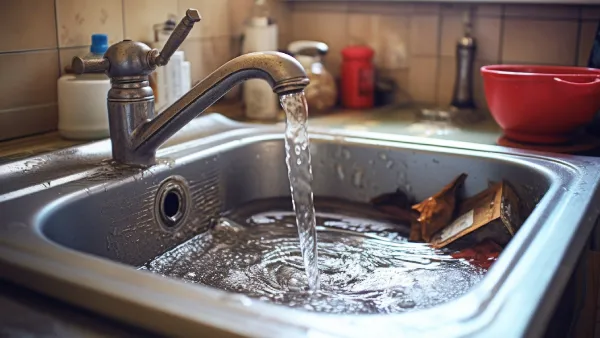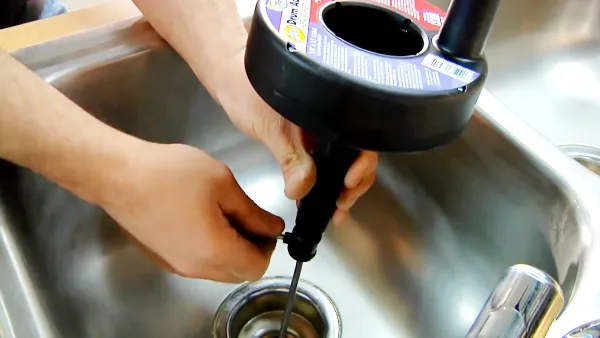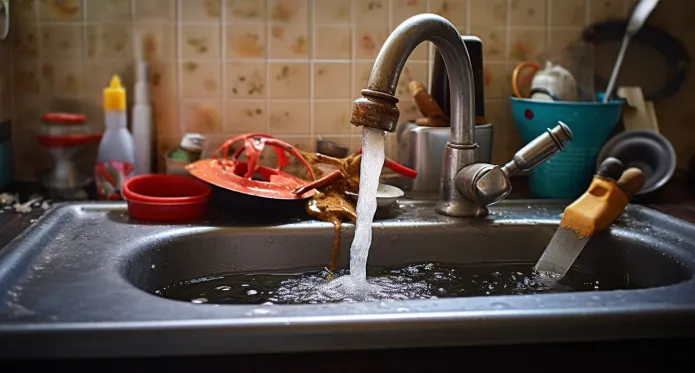Last Updated on November 14, 2023
A functional and unobstructed kitchen sink is essential to your living space. You may encounter sink overflows that prevent you from cleaning your kitchen utensils and accessories.
If you know why your sink is overflowing and how to address the issue, you can avoid major repair costs.
The most common cause of clogged drains is clogged drain pipes. Another possibility is to use the garbage disposal improperly. And faulty sink components or backed-up sewer lines could be the issue.
Throughout this article, we’ll look into why your sink is overflowing and share how to fix it. So, grab your tools and get ready to tackle this plumbing problem head-on.
Why Your Sink Is Overflowing: Causes and Solution

Kitchen sinks are used for more than just washing dishes. And there are several reasons why they can start overflowing. These are some of the most common causes:
- Clogged drain pipes
- Improper usage of garbage disposal
- Faulty sink components
- Backed-up sewer lines
- Using drain cleaners incorrectly
- Inadequate ventilation
- Old plumbing system
No 01: Clogged Drain Pipes
Clogged drain pipes can cause your kitchen sink to overflow, leading to a messy and inconvenient situation. Drain catchers can prevent food scraps, grease, oil, and other debris from entering the pipes and causing clogs. These catchers act as a barrier, allowing only water to flow through while trapping the solid materials.
You can prevent clogged drain pipes by using drain catchers and avoiding putting large food scraps down the kitchen sink. Instead, scrape leftover food into the trash or compost bin.
No 02: Improper Usage of Garbage Disposal
Improper garbage disposal use can lead to clogs and backups in your sink. The disposal can become clogged when large amounts of food waste are thrown, tough items such as bones or fibrous vegetables.
As a solution, it’s essential to use the garbage disposal as intended and avoid overloading it with too much waste at once. Instead, scrape excess food waste into a compost bin, seal it in a plastic bag, and dispose of it in the regular trash.
No 03: Faulty Sink Components
Kitchen sinks have drain traps (P-traps) that help prevent overflow. If these components are damaged, loose, or improperly connected, they can lead to sink overflow issues.
To fix this issue, inspect P-traps for any signs of damage or looseness. If you notice any issues, tighten or replace the components as necessary.
Also, check the connections between these components and the rest of the plumbing system. Ensure they’re properly aligned and securely fastened.
No 04: Backed-up Sewer Lines
In some cases, the cause of a kitchen sink overflowing may be beyond your control. If the main sewer line that connects your home to the municipal sewer system becomes clogged or damaged, it can lead to backups into your kitchen sink.
If you want to fix the issue, the first step is to contact a licensed plumber specializing in sewer line repairs. They’ll use specialized tools and techniques to identify the source of the blockage or damage and determine the best course of action.
No 05: Using Drain Cleaners Incorrectly
While drain cleaners can effectively clear minor clogs, using them incorrectly or excessively can exacerbate the problem. Pouring drain cleaner into a fully backed-up sink may not work and could lead to dangerous chemical reactions.
In order to resolve this issue, follow the product instructions precisely. Be cautious and avoid excessive use of drain cleaners.
If you’re dealing with a severe clog, it’s best to consider professional help. They have the expertise and tools to handle stubborn blockages safely and efficiently.
No 06: Inadequate Ventilation
When dealing with an overflowing kitchen sink, you should address the issue of inadequate ventilation, as it can contribute to the problem. Proper ventilation is crucial for the drainage system to function correctly.
If the venting system is blocked or damaged, it can create negative pressure in the drainpipes, leading to water backup and overflow in the sink.
Ventilation problems can be resolved by clearing any blockages in the vent pipes or repairing any damage. The venting problems may require professional inspection and repair.
No 07: Old Plumbing System
Older homes often have outdated plumbing systems that are more prone to problems like pipe corrosion, leaks, and weakened pipes. These issues can lead to sink overflows, causing inconvenience and potentially damaging your kitchen.
You should consider upgrading your old plumbing system if you are experiencing frequent sink overflows. This will help prevent further problems and maintain a reliable drainage system in your kitchen.
How to Prevent Kitchen Sink From Overflowing?

To prevent your kitchen sink from overflowing, you can follow a few simple tips.
- Maintaining and cleaning your sink and drains regularly can prevent buildup and blockages.
- Use drain catchers to prevent food scraps and debris from clogging the pipes.
- Avoid overloading the garbage disposal and instead scrape off excess food into the trash.
- Be mindful of sink usage, educating household members to avoid pouring oils, fats, and grease down the drain.
- Regularly inspecting and cleaning the drain P-trap can identify signs of damage or leaks.
- Scheduling professional inspections can ensure your kitchen sink operates smoothly, preventing potential overflows, leaks, and costly damages.
Can using hot water prevent sink overflows?
Using hot water regularly can help prevent kitchen sink overflows by breaking down grease and keeping your drains clear. By flushing your sink with hot water, you can prevent the buildup of these materials and reduce the risk of clogs and overflows.
Even so, you must note that hot water alone isn’t enough. You should use drain catchers and avoid pouring fats, oils, and grease down your sink to ensure optimal prevention.
Are there any smart devices that can help prevent sink overflows?
You can install smart water sensors or leak detection systems under your sink, and they can alert you to potential overflows or leaks. These devices are equipped with advanced technology that can help you detect even the smallest leaks, allowing you to take immediate action.
The sensors are designed to monitor water levels in real time, sending notifications to your smartphone or other devices when an overflow or leak is detected. This can help prevent costly water damage and the hassle of dealing with a flooded kitchen.
Get Rid of Your Kitchen Sink Overflows
Preventing kitchen sink overflows is not only about addressing clogs and drainage issues but also involves responsible usage and regular maintenance.
It is possible to prevent overflows and costly plumbing repairs by using proper disposal practices, drain catchers, and routine inspections.
With these proactive measures and knowledge at your disposal, you can enjoy a trouble-free kitchen sink and a more efficient home plumbing system. So don’t wait; take action and get your kitchen sink overflow-proof today.

